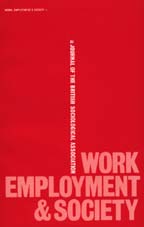Crossref Citations
This article has been cited by the following publications. This list is generated based on data provided by
Crossref.
Hockey, John
2002.
Occupational time: the case of UK social science contract researchers.
Research Papers in Education,
Vol. 17,
Issue. 3,
p.
323.
Collinson, Jacquelyn Allen
2003.
Working at a Marginal ‘Career’: The Case of UK Social Science Contract Researchers.
The Sociological Review,
Vol. 51,
Issue. 3,
p.
405.
Collinson, Jacquelyn Allen
2004.
Occupational Identity on the Edge.
Sociology,
Vol. 38,
Issue. 2,
p.
313.
Collinson, Jacquelyn Allen
2006.
Just ‘non-academics’?.
Work, Employment and Society,
Vol. 20,
Issue. 2,
p.
267.
Brown, Donna
and
Gold, Michael
2007.
Academics on Non‐Standard Contracts in UK Universities: Portfolio Work, Choice and Compulsion.
Higher Education Quarterly,
Vol. 61,
Issue. 4,
p.
439.
Rees, Gareth
Baron, Stephen
Boyask, Ruth
and
Taylor, Chris
2007.
Research‐capacity building, professional learning and the social practices of educational research.
British Educational Research Journal,
Vol. 33,
Issue. 5,
p.
761.
Fowler, Zoe
Baird, Adela
Baron, Stephen
Susan, M.B.D
Procter, Richard
and
Salisbury, Jane
2009.
Building research capacity in Education: evidence from recent initiatives in England, Scotland and Wales.
International Journal for Researcher Development,
Vol. 1,
Issue. 2,
p.
173.
Dear, Denise V.
2010.
How much difference can policy make to professional contract researchers?.
International Journal for Researcher Development,
Vol. 1,
Issue. 4,
p.
257.
Davies, Sarah R.
2013.
Research staff and public engagement: a UK study.
Higher Education,
Vol. 66,
Issue. 6,
p.
725.
Harney, Brian
Monks, Kathy
Alexopoulos, Angelos
Buckley, Finian
and
Hogan, Teresa
2014.
University research scientists as knowledge workers: contract status and employment opportunities.
The International Journal of Human Resource Management,
Vol. 25,
Issue. 16,
p.
2219.
Kalfa, Senia
Wilkinson, Adrian
and
Gollan, Paul J
2018.
The Academic Game: Compliance and Resistance in Universities.
Work, Employment and Society,
Vol. 32,
Issue. 2,
p.
274.
Woods, Carl T.
Araújo, Duarte
McKeown, Ian
and
Davids, Keith
2023.
Wayfinding through boundaries of knowing: professional development of academic sport scientists and what we could learn from an ethos of amateurism.
Sport, Education and Society,
Vol. 28,
Issue. 7,
p.
785.
Kosmarski, Artyom
Kartavtsev, Vladimir
and
Odintsov, Alexander
2023.
Evading Transparency, Doubting Democracy, Dreaming Big: Grassroots Perspectives on Science Governance in Russia.
Problems of Post-Communism,
Vol. 70,
Issue. 4,
p.
453.


